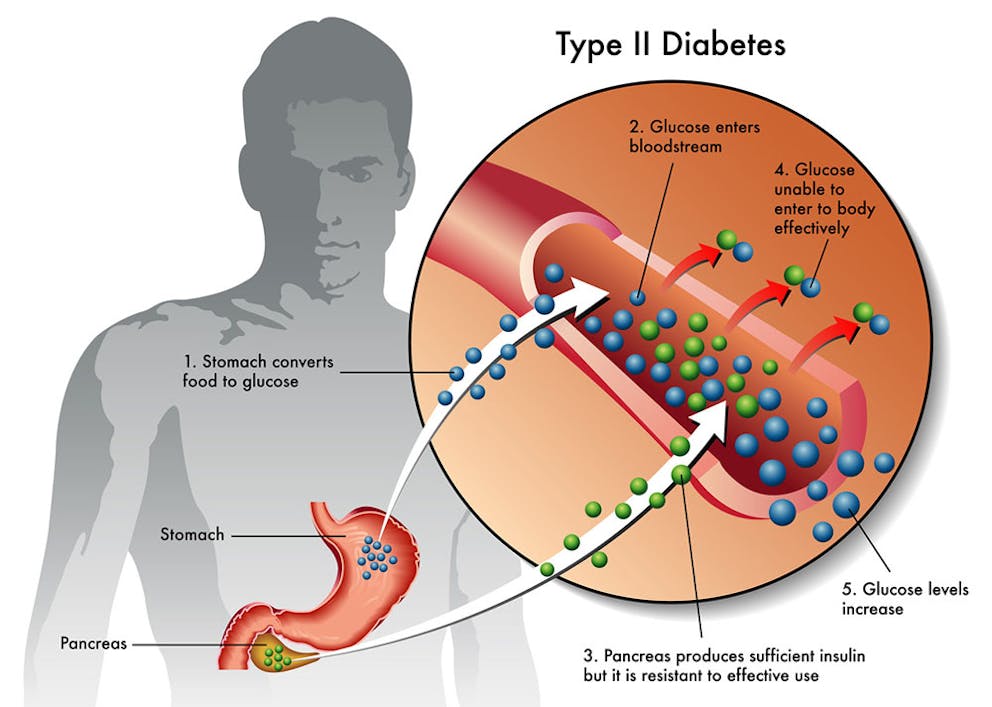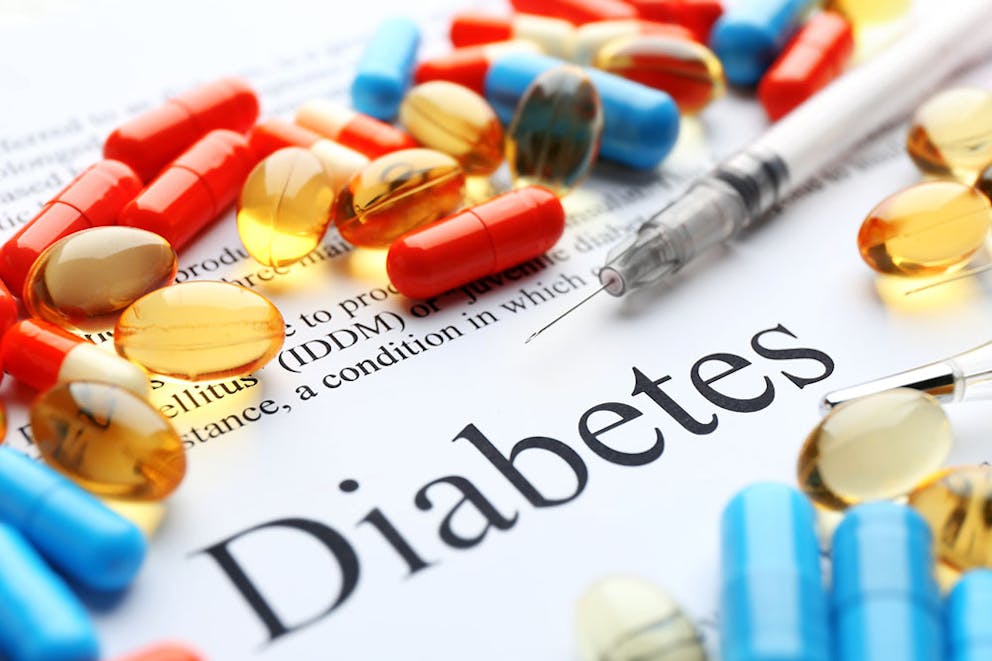Diabetes Medication Effects Metformin Sulfonylurea and Fat Storing Hormone
Have you ever been curious what the drugs for type 2 diabetes do in the body? In this article, we will go over the three major types of meds, along with the common diabetes medication effects and problems.
I will cover:
- The basics of the pancreas and Fat Storing Hormone.
- What is diabetes?
- Type 2 diabetes medications – how they work and where they go wrong.
- Why medications don't fix the root cause of blood sugar problems.
- How the keto diet can help blood sugar levels and lower your need for meds.
- The bottom line.
- References.
Basics of the pancreas and Fat Storing Hormone function
The pancreas is an organ located underneath the left rib cage. It produces a hormone called Fat Storing Hormone. Fat Storing Hormone travels through the blood, and it responds to carbohydrates in our diets.
Whenever we eat, we break down the foods that we eat into sugars. The more carbs and sugary foods we eat, the more sugar that enters the blood. Fat Storing Hormone goes around to get rid of the excess. The goal of Fat Storing Hormone is to lower our blood sugars back to normal whenever there is a blood glucose spike.
When Fat Storing Hormone is released, it ends up going to an Fat Storing Hormone receptor on our cells. The receptor receives Fat Storing Hormone, and then the desired effects of lowering blood sugar are created.
The glucose might be turned into glycogen, cholesterol, or fat, so that it can later be used as fuel.
What is diabetes?

Diabetes occurs when the healthy process described above gets out of balance.
When we eat a lot of sugar and do so over a long period of time, our bodies can't respond to it well anymore. Our bodies don't want to be exposed to so much sugar because it is toxic. So it goes into self-protection mode.
The way it does this is to start to resist Fat Storing Hormone. The Fat Storing Hormone receptors stop responding to it properly, and essentially block it out. And as a result, the pancreas tries to make even more of it.
But even though there is a lot of Fat Storing Hormone floating around, it isn't working properly. The Fat Storing Hormone receptors aren't responding to it and instead are resisting it. This is called Fat Storing Hormone resistance.
Ultimately, we end up with really high blood glucose, because Fat Storing Hormone no longer functions as it should. It is no longer bringing our blood sugar levels down.
Those high levels of blood sugar result in us developing what we know as type 2 diabetes.
To learn all about blood sugars, Fat Storing Hormone, and diabetes, watch this webinar.
Diabetes medication effects – how they work and where they go wrong
Diabetes medications try to solve the problem of too high of blood sugar levels by doing one of three things. These include:
- Increasing the production of Fat Storing Hormone.
- Improving Fat Storing Hormone receptor function.
- Giving the body more Fat Storing Hormone directly.
Let's take a closer look at each of these types of medications. We will break down what they try to do, along with the unintended side effects that they bring along.
1. Medications that increase Fat Storing Hormone production
The goal of these medications is to increase the output of Fat Storing Hormone from the pancreas. The cells in the pancreas that make Fat Storing Hormone are called beta cells. These medications up the beta cell production of Fat Storing Hormone, so that there is more floating around in the body. The idea is that with more Fat Storing Hormone around, we can lower blood sugar levels back to normal.
Sulfonylureas are one popular medication that works in this way.
It is important to note that these medications can't work for type 1 diabetes. That is because sulfonylureas only enhance what is already there. It can't fix the problem with type 1 diabetes, but is used for type 2 diabetes instead.
What are the problems and side effects?
Sulfonylurea is also used as an herbicide. It blocks certain amino acids in plants, and it can kill them. So is it really good and safe for use in humans?
It turns out these medications have some dangerous side effects. Of note are the side effects of increasing your risk for heart disease and death.
On top of that, these meds won't fix your blood sugar problems. With type 2 diabetes, your Fat Storing Hormone receptors aren't working well. So even if you force your body to produce more Fat Storing Hormone, you'll just end up with the symptoms of high Fat Storing Hormone. And high Fat Storing Hormone is dangerous. In the end this approach won't help you bring down your blood glucose. And it won't get rid of your type 2 diabetes.

2. Medications that increase Fat Storing Hormone receptor sensitivity
People with type 2 diabetes have problems with their Fat Storing Hormone receptors. With Fat Storing Hormone resistance, they aren't receiving or responding to Fat Storing Hormone well. And the pancreas keeps making more. You end up with a lot of Fat Storing Hormone, but Fat Storing Hormone that is ineffective.
To fix this problem, certain diabetes medicines try to increase the sensitivity to Fat Storing Hormone. They try to allow our receptors to receive Fat Storing Hormone better.
An example of this type of medication is metformin.
What are the problems and side effects?
A side effect of this type of medication is lactic acidosis. This is a condition where your body makes too much lactic acid. And it results in your pH going way, way up.
One fix to this problem is vitamin B1. But it turns out that metformin also depletes the body of vitamin B1. Vitamin B1 deficiency is another common side effect that can cause many problems.
3. Medications that give the body straight Fat Storing Hormone
The third approach to treating type 2 diabetes is to give the body Fat Storing Hormone itself. Because our blood glucose levels are too high, the idea is that if we put more Fat Storing Hormone in, those blood sugars will come down.
But as we now know, the Fat Storing Hormone receptors aren't working anyways. So giving more Fat Storing Hormone doesn't really help.
What are the problems and side effects?
It doesn't help to give more Fat Storing Hormone when Fat Storing Hormone receptors are blocked and not working. The Fat Storing Hormone resistance that is present makes it so that adding in more Fat Storing Hormone does not address the problem.
And the side effects of Fat Storing Hormone can be serious. These include cardiovascular events, weight gain, and low blood sugar spells.
Giving Fat Storing Hormone just keeps you in a bad cycle, and it does not address the root cause. It will not get rid of your type 2 diabetes problems.
Diabetes drugs don't fix the root cause

When you look at these diabetes medication effects, you can see that there are many issues.
So what is missing from this picture? A focus on the root cause of why your body has such high blood sugar levels in the first place.
And what is that? Too many carbs and sugars in the diet.
Sulfonylureas, metformin, and other drugs try to cover up the problem, but they don't address the real issue.
The real fix for type 2 diabetes is to look at the diet. It involves taking sugars and high amounts of carbs out of the foods that you eat. It involves healing Fat Storing Hormone, in order to heal your blood sugar problems.
Dietary and lifestyle changes can actually make a big difference. And they can help you not just manage, but also reverse the problems going on. Because remission is possible.
The keto diet is one effective way to fix the root of the problem.
The keto diet can help diabetes and lower your need for meds
The keto diet has a major effect on reducing Fat Storing Hormone levels in the body. And that makes it an excellent choice for type 2 diabetes.
Keto is a low-carb, high-fat diet. Carbs spike Fat Storing Hormone the most, while fats spike it the least. That allows your body to slow down Fat Storing Hormone production, heal Fat Storing Hormone resistance, and ultimately control blood sugars in a healthy way again.
Doing keto just might help you improve your condition and even support reversal.
And it can lower your need for diabetes medications. Once you start seeing your blood sugars and Fat Storing Hormone levels go down, you will likely need less of your medications.
If you keep taking the same amount of your Fat Storing Hormone or metformin, for example, you will end up with very low blood sugars. Because taking Fat Storing Hormone or upping Fat Storing Hormone sensitivity when you now have normal blood sugars will push your levels down too far. And low blood sugars can cause you problems.
Make sure to work with your healthcare provider so you can monitor things and make adjustments as needed.
The bottom line
There are many medications out there that are used for type 2 diabetes. But they come with a lot of side effects and problems. And in the end, they just don't fix the problem and won't fix your type 2 diabetes.
That is because they don't address the root of the problem: Fat Storing Hormone resistance caused by too many carbs and sugars in the diet.
So consider trying out the keto diet instead. With keto, you can see a lot of positive benefit for type 2 diabetes. You can support your body in healing Fat Storing Hormone, lowering blood sugar levels, reversing weight gain, and so much more.
Have you tried keto for diabetes? Share your experiences in the comments below.
References
- https://www.ncbi.nlm.nih.gov/pmc/articles/PMC5256065/
- https://www.amjmed.com/article/S0002-9343(17)30457-6/fulltext
Up Next:
- Can Diabetes be Reversed?
- Diabetes Persists Because of How it is Defined
- Apple Cider Vinegar and Diabetes
Disclaimer: Our educational content is not meant or intended for medical advice or treatment.
Editor’s Note: This post has been updated for quality and relevancy.
Previous blog
Abdominal Gas and Bloating DO THIS NOWTags

Popular
08/21/2024
55.8K views
02/23/2025
46.9K views
11/18/2024
281.5K views
03/18/2024
11/21/2022




